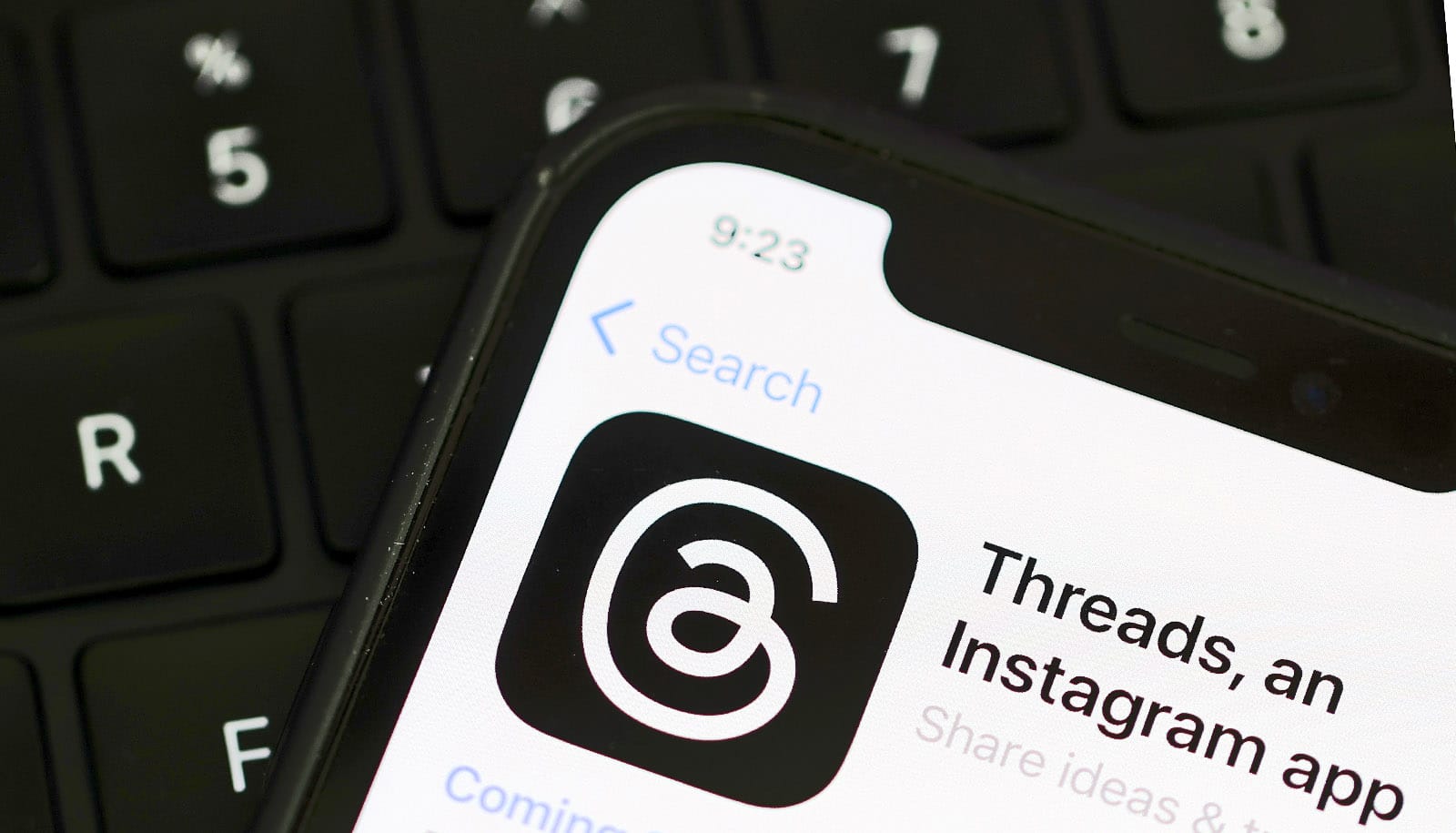Is the new social network Threads a privacy nightmare? An expert argues that it doesn’t represent a new threat to people already using Facebook or Instagram.
Since its October 2022 takeover by Tesla founder Elon Musk, Twitter has been plagued by seemingly constant tech issues or been sucked into the vortex of its new owner’s propensity for divisive statements. Advertisers have reportedly fled the site, while many users have been on the hunt for an alternative place to share their latest news.
Meta, the owner of Facebook and Instagram, hopes it can take advantage. On Thursday, it launched a new rival to Twitter, called Threads.
Because the app ties into Instagram, users of the popular photo and video social network can link their accounts between the two, sharing Threads messages on Instagram and following users from one app on the other—allowing them to quickly make connections and build followers. Given Instagram’s reach—it has comfortably north of one billion users—many analysts expect Threads to be a serious threat to Twitter. The format is similar: post short messages for others to like, share, or comment on. But there are differences: messages can be 500 characters versus Twitter’s 280, videos can be 5 minutes versus 2 minutes 20 seconds. And there’s no direct messaging or hashtags, at least for now. It’s currently available in 100 countries, including the United States.
Not everyone is jumping on the Threads bandwagon, though. Concerns have been raised about how much personal information users have to sign over to join the social network. TechCrunch said the app “already looks like a privacy nightmare,” reporting it “may collect highly sensitive information about users in order to profile their digital activity—including health and financial data, precise location, browsing history, contacts, search history, and other sensitive information.” The app currently isn’t available in the European Union, which has tougher privacy rules than the United States does.
Should disillusioned Twitter users head over to Threads or hold back due to privacy concerns? Garrett Johnson, an assistant professor of marketing at Boston University Questrom School of Business, has some answers below. Johnson has studied online privacy and behavioral targeting, particularly when it comes to online advertising. Johnson has also examined the EU’s online privacy law, General Data Protection Regulation (GDPR), which was recently used to fine Meta $1.3 billion.
Should we be worried about the amount of data Meta plans to collect through Threads?
I don’t think that there’s going to be a massive increase in data collection, because a lot of people already belong to Facebook or Instagram. And a lot of websites have Meta’s tracking pixel to connect to advertiser outcomes. So, to move the needle, you need new people who are not members of Facebook or Instagram to join, which is probably not a lot at this point, and [you need] new data to be collected through that platform—there, too, I don’t see a whole lot of scope. Facebook already knows who our friends are. I guess Meta may gain a better sense of who our professional contacts are, but I don’t see a massive increase in data collection here.
How does Meta use our data and is it necessarily a bad thing?
I would think about Meta’s data in two broad categories: more costly data from its perspective and revenue-generating data from its perspective. The information that we share via friends—photos, videos, and conversations—most of that is purely a cost from Facebook’s perspective. It’s a value we get as a consumer, and that we typically get for free, but it’s not something that Facebook gets a lot of value from. And then the other part is the more advertising-related data. And that’s basically what people’s interests are in terms of commercially relevant things and how well the advertising is performing. And that is largely a function of Facebook’s offsite data. So, if we’re seeing an ad for bourbon, and we then visit the website of the bourbon manufacturer, Facebook gets some sense that we’re interested in bourbon. And so it shows us bourbon ads instead of ads for rum.
Is Threads all that different from any other app we gleefully sign up for when it comes to collecting and using our data?
It’s the same. Very long legalese in the privacy policy and some explanation of how the data is used. Most people aren’t digging into the depths of it, but they can probably imagine the sort of data that’s being used.
Do you read those agreements?
Oh, no. We’re not the audience for those agreements—lawyers are.
The EU is taking a tough line on Meta’s use of data, notably with that $1.3 billion fine for breaking its privacy rules. Do you think the United States should be doing the same?
There are two reasons why the EU is going hard after Facebook. The first is that Facebook is sharing data with the United States. The largest GDPR fine in history was simply just because Facebook was sharing data with the United States. The United States is not a fully approved data destination, basically because of the Snowden revelations of the Americans looking into people’s browsing activities. So, the important thing to realize is that Facebook is guilty of the same crime as anybody that is sharing data between the EU and the United States. There’s not really anything that needs to be done other than these two governments need to somehow get their heads together and figure this out.
The second part is Facebook’s legal basis for collecting data under the GDPR, and that has been challenged by the European Union. In a nutshell, the European Union wants Facebook to get consumer consent to use all this data and Facebook has been trying to use some other legal bases, like what’s called contractual necessity and legitimate interest.
Has the GDPR been a positive force overall and is it something the United States should be looking to emulate?
One thing that GDPR tries to do is create some baseline privacy protections, and I think that could be a desirable thing for the United States to pursue. There are a couple of challenges with the GDPR. One is that it treats all data, all personal data, more or less equally. You might imagine [instead] focusing more on data that is particularly sensitive, for instance, or risky from a privacy perspective to reduce the considerable cost of the regulation.
Another thing that the regulation really struggles with is that a lot of data is economically valuable to use and it’s really hard to regulate the use of that data. Facebook provides an interesting example, because it’s providing a service free of charge to users that we value. And in order to pay for all of that data storage—all those conversations and puppy and cat pictures—it’s monetizing the data for the purposes of advertising. And the fight with the European Union is, they say, “Well, Facebook could exist without this targeted advertising.” And maybe, in a technical sense, it could. But there’s a lot of value being generated by our personal data to improve the targeting effectiveness of advertising. And that’s really what pays for all of these free services.
In my research, I’ve tried to quantify the value of personalized advertising to industry and to consumers. I have one study that shows when consumers opt out of targeted advertising, ad prices fall by 52%.
If you have the mindset that firms are just collecting this data because they’re bad and they want to violate the privacy of users, rather than users are trading their privacy for these free services and it’s a mutually beneficial arrangement, that can lead to regulation that misses the mark.
What else would you want people to know about Threads before signing up?
The downside here is that we’ve got a company that is dominant in the social media space potentially increasing its power by offering a Twitter competitor. The upside, though, is that Twitter’s having a lot of problems. It’s being run very, very poorly by its owner. And so the fact that another company can enter this space could be good for consumers. I’m a power Twitter user. I’ve been extremely frustrated with what Elon Musk has done to that company. And it’s very hard to spin up a competitor to Twitter, because these services are really expensive to run. Who better than Facebook to be able to actually offer something that can scale and is consumer-friendly?
Twitter and Bluesky—they’re complaining about privacy issues with Threads, but they’re going to try to undercut a competitor somehow. And the reality is that Meta is a strong competitor. At the end of the day, consumers are going to vote with their feet.
Have you tried any Twitter alternatives? And will you be giving Threads a try?
I joined Threads last night. I’d previously joined Mastodon, which has a couple of challenges—it’s not very user friendly and doesn’t scale very well. And so that’s where Facebook entering has a lot of promise.
Source: Boston University



